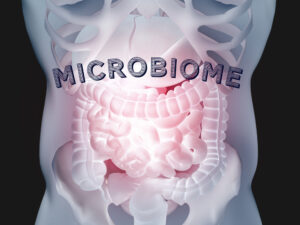
The immune system in the gut is an essential component of overall health. It’s responsible for protecting the body against harmful microorganisms that can cause infection and disease. The gut microbiome, which consists of trillions of microorganisms, plays a crucial role in the development and maintenance of the gut immune system.
Research has shown that a diverse and healthy gut microbiome is essential for optimal gut health and overall well-being. A diet high in fiber and prebiotics, along with regular exercise and stress management, can help support a healthy gut microbiome and immune system.
Probiotics, which are live microorganisms that can provide health benefits when consumed in adequate amounts, have also been shown to support gut health and the immune system. Additionally, certain compounds found in food, such as vitamins and other nutrients, can also play a role in supporting immune function in the gut.
The Gut Microbiome and Immune System
The Gut Microbiome
The gut microbiome is the collection of microorganisms that live in the digestive tract. It’s composed of trillions of bacteria, viruses, fungi, and other microorganisms. The gut microbiome is essential for digestion, nourishment, and maintaining overall health. The diversity of microorganisms in the gut is crucial for a healthy gut microbiome.
The gut microbiome plays a crucial role in the immune system. It helps to regulate the immune system by training it to recognize and respond appropriately to harmful pathogens. The gut microbiome also produces short-chain fatty acids that help to nourish the cells of the gut lining.
The Immune System
The immune system is a complex network of cells, organs, and tissues that work together to defend the body against harmful pathogens. The immune system is essential for maintaining overall health and preventing infections.
The gut microbiome and the immune system are closely interconnected. The gut microbiome helps to regulate the immune system by training it to recognize and respond appropriately to harmful pathogens. The immune system, in turn, helps to maintain a healthy gut microbiome by eliminating harmful microorganisms.
Probiotics and prebiotics are two types of substances that can help to support a healthy gut microbiome and immune system. Probiotics are live microorganisms that can be found in certain foods, such as yogurt and kefir. Prebiotics are a type of fiber that can be found in certain foods, such as onions and garlic. Both probiotics and prebiotics can help to nourish the gut microbiome and support a healthy immune system.
In summary, the gut microbiome and immune system are closely interconnected. The diversity of microorganisms in the gut is crucial for a healthy gut microbiome, which in turn helps to regulate the immune system. Probiotics and prebiotics can help to support a healthy gut microbiome and immune system.
The Role of Gut Bacteria
Gut Bacteria and Health
The human gut is home to trillions of microorganisms, including bacteria, viruses, and fungi. These microorganisms play a crucial role in maintaining gut health, which in turn affects overall health. Gut bacteria help with digestion, nutrient absorption, and immune system function. They also produce vitamins and other compounds that are essential for good health.
Studies have shown that a healthy balance of gut bacteria can help prevent a range of health problems, including obesity, type 2 diabetes, and heart disease. In fact, some researchers believe that maintaining a healthy gut microbiome may be one of the keys to overall health and longevity.
Gut Bacteria and Disease
On the other hand, an imbalance of gut bacteria, known as dysbiosis, has been linked to a range of health problems. Dysbiosis can lead to inflammation in the gut, which can contribute to a number of diseases, including inflammatory bowel disease, autoimmune diseases, and cancer.
Research has also shown that gut bacteria can play a role in infectious diseases. For example, certain strains of gut bacteria can protect against infections by producing antimicrobial compounds. Other strains, however, can make infections worse by producing toxins that damage the gut lining.
In summary, gut bacteria play a crucial role in maintaining gut health and overall health. A healthy balance of gut bacteria can help prevent a range of health problems, while an imbalance can contribute to inflammation and disease. Further research is needed to fully understand the complex relationship between gut bacteria and health.
The Immune System in the Gut
The Anatomy of the Immune System in the Gut
The gut is home to a complex network of immune cells that work together to protect the body from harmful pathogens. The immune system in the gut includes Peyer’s patches, lymphoid follicles, and other specialized immune cells that are scattered throughout the intestinal lining.
The Function of the Immune System in the Gut
The immune system in the gut plays a critical role in maintaining a healthy gut microbiome and preventing infections. When harmful bacteria or viruses enter the gut, the immune system responds by producing antibodies and activating immune cells to eliminate the threat. In addition to protecting against infections, the immune system in the gut also helps to regulate inflammation and prevent autoimmune disorders.
The Relationship Between Gut Bacteria and the Immune System
The gut microbiome plays a crucial role in shaping the immune system in the gut. The bacteria in the gut help to train the immune system to recognize and respond to harmful pathogens while also promoting the development of immune cells that help to maintain a healthy gut. Disruptions to the gut microbiome, such as those caused by antibiotic use or a poor diet, can lead to dysregulation of the immune system and an increased risk of inflammatory bowel disease and other gut-related pathologies.
Overall, the immune system in the gut is a complex and dynamic system that plays a critical role in protecting the body from harmful pathogens and maintaining a healthy gut microbiome. By understanding the anatomy and function of the immune system in the gut, researchers and clinicians can develop new strategies for preventing and treating gut-related illnesses.
The Impact of Diet and Lifestyle on the Gut Microbiome and Immune System
 Diet and the Gut Microbiome
Diet and the Gut Microbiome
The gut microbiome is a complex ecosystem of microorganisms that reside in the digestive tract. The composition of the gut microbiome is influenced by numerous factors, including diet. Studies have shown that a diet high in fiber and plant-based foods can promote the growth of beneficial bacteria in the gut, while a diet high in processed foods and sugar can lead to an overgrowth of harmful bacteria.
In addition to promoting the growth of beneficial bacteria, a healthy diet can also help reduce inflammation in the gut. Chronic inflammation can damage the gut lining and compromise the immune system, making it more susceptible to infection and disease.
Consuming a variety of nutrient-dense foods can also help ensure that the body is getting the vitamins and minerals it needs to support a healthy immune system. For example, vitamin D is important for immune function and can be obtained through exposure to sunlight or through dietary sources such as fatty fish and fortified foods.
Lifestyle and the Gut Microbiome
In addition to diet, lifestyle factors such as stress and exercise can also impact the gut microbiome and immune system. Chronic stress can disrupt the balance of bacteria in the gut and lead to inflammation, while regular exercise has been shown to promote the growth of beneficial bacteria and reduce inflammation.
Getting enough sleep is also important for immune function, as sleep deprivation can weaken the immune system and make it more difficult for the body to fight off infections. Additionally, avoiding behaviors such as smoking and excessive alcohol consumption can help protect the gut microbiome and support overall immune health.
Overall, maintaining a healthy diet and lifestyle can have a significant impact on the gut microbiome and immune system. By promoting the growth of beneficial bacteria and reducing inflammation, individuals can help support their body’s natural defenses and reduce the risk of infection and disease.
Conclusion
The immune system in the gut is a complex and dynamic network of cells and molecules that play a crucial role in maintaining the health of the digestive system and the body as a whole. It’s clear that the gut immune system is intimately linked with the gut microbiota, and that disturbances in this relationship can lead to a range of health problems.
While much remains to be learned about the gut immune system, recent research has shed light on some of its key features and functions. For example, we now know that the gut immune system is capable of discriminating between harmful and beneficial bacteria, and that it can mount powerful responses to invading pathogens while maintaining tolerance to harmless commensal microbes.
Researchers are also investigating the potential of modulating the gut immune system to treat a range of health conditions, including inflammatory bowel disease, allergies, and even cancer. While much work remains to be done, these efforts hold promise for improving human health and well-being.
